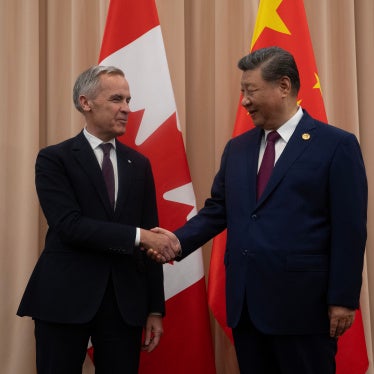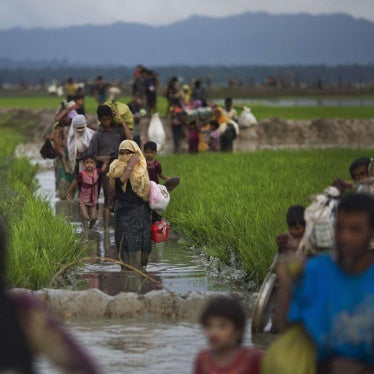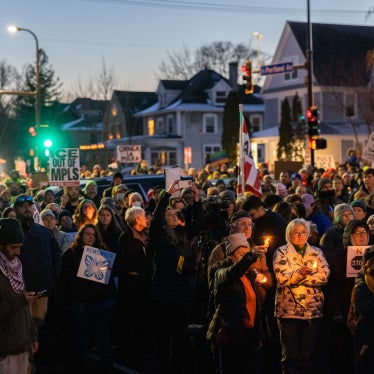On July 12, 2011, Wang Chen, the head of China's State Council Information Office, announced that "the cause of human rights in China has entered a new stage." This was not an exaggeration. Since mid-February 2011, the Chinese government, spooked by the pro-democracy movements in North Africa and the Middle East, has detained, arrested, and forcibly disappeared dozens of Chinese lawyers, civil society activists, artists and bloggers. This "new stage" is the worst repression in China in more than a decade.
Those targeted have included the activist-artist Ai Weiwei, who was forcibly disappeared and remained in police custody under "residential surveillance" for 80 days until his release on June 22 after allegedly confessing to tax fraud. The whereabouts of others, such as the Guangzhou-based human rights lawyer Liu Shihui, who disappeared after being brutally beaten by a group of unidentified individuals on February 20, remain a mystery to all but their security agent abductors.
Wang was not referring to the victims of the Chinese government's increasingly lower tolerance for dissent, however. His remarks were instead part of the long-awaited official assessment of the Chinese government's first-ever National Human Rights Action Plan. The plan, unveiled in April 2009, marked the government's first explicit attempt to identify and address human rights abuses within a specific time frame on issues ranging from torture in custody and illegal detention to the "overall promotion of digitalized movie, radio and TV service."
Wang, who does double-duty as the director of the ruling Chinese Communist Party's External Propaganda Department, was sanguine about the plan's success. According to him, "by the end of 2010, all measures stipulated in the Action Plan had been put into practice with all goals achieved and tasks fulfilled." He added that the government planned to replicate that "success" in a new, four-year National Human Rights Action Plan from 2012-2015.
In theory, a national human rights action plan-a recommendation for all states stemming from the 1993 UN World Conference on Human Rights-can provide an opportunity for a government to honestly identify and seek resolution of urgent human rights problems. The Chinese government deserves some credit for making an attempt at such a plan. Its first plan was notable for the government's explicit rhetorical shift from a traditional prioritization of "rights of subsistence and development" over civil and political rights by specifically acknowledging that "all kinds of human rights are interdependent and inseparable."
In its details, the plan was less impressive. Rather than outlining innovative approaches to tackle well-documented human rights problems, it did little more than reiterate existing commitments under international and domestic law as well as the Constitution of the People's Republic of China. Rather than reflecting broad government support, the plan lacked the input and participation of the security agencies-which are responsible for the overwhelming majority of China's human rights abuses. In addition, the Plan also lacked any substantive benchmarks or the kind of detail that would allow for meaningful assessment of progress.
The Chinese government's demonstrable disdain for human rights over the plan's two year duration speaks volumes about its intentions. In 2009-1010, the government systematically continued to violate many of the most basic rights the plan addressed. It took unambiguous steps to restrict rights to expression, association and assembly. It sentenced high-profile dissidents to lengthy prison terms on spurious state secrets or "subversion" charges, expanded restrictions on media and internet freedom as well as tightened controls on lawyers, human rights defenders, and nongovernmental organizations. It broadened controls on Uighurs and Tibetans, and engaged in increasing numbers of enforced disappearances and arbitrary detentions, including in secret, unlawful detention facilities known as "black jails."
Wang Chen's assessment of the plan makes no mention of such abuses. Instead, his assessment is larded with irrelevant statistics ("By the end of 2010, China had formulated 236 laws ... 690 administrative regulations and more than 8,600 local rules and regulations"), meaningless ambiguities ("Over the past two years, China has perfected laws and regulations to protect the rights and interests of ethnic minorities"), and bald-faced lies ("extorting confession by torture and illegal detention by law enforcement personnel has been strictly forbidden"). This does not bode well for the next plan, slated to run from 2012-2015.
If the Chinese government is serious about formulating an effective plan for 2012-2015, it must acknowledge and learn from the shortcomings of the 2009-2010 plan. That will require an independent review commission to evaluate the success of the original plan to identify the gaps between the plan's rhetoric and their implementation. Any plan with a hope of success will require the participation and cooperation of the Public Security Bureau. Rather than the hortatory, opaque and ambiguous slate of objectives which hobbled the original plan, a new 2012-2015 document must incorporate transparent benchmarks to measure progress in areas including enforcement of prohibitions on torture and illegal detention and enforcing rights including freedom of expression, assembly and association.
The success of any human rights action plan will ultimately hinge on ensuring government officials and security forces choose to obey and uphold the law rather than reflexively ignore, subvert and abuse it. At a time of rising popular unrest related to China's yawning rural-urban wealth gap, growing labor unrest, tension in its ethnic minority regions, and simmering public resentment over rampant corruption and illegal land evictions, the Chinese government's disregard for rule of law is an increasingly dangerous formula for instability.
Without true rule of law, any official action plan to protect the rights of Chinese citizens such as Ai Weiwei and Li Shihui will remain empty promises on paper.
Phelim Kine is a senior Asia researcher in Human Rights Watch's Asia Division. He has written on human rights, military impunity, corruption, child sex tourism, human trafficking, and illegal land confiscation. Kine's opinion pieces on China's human rights challenges have appeared in a wide range of media outlets, and he has spoken on such issues before the European Parliament, the Council on Foreign Relations and the US-China Economic and Security Review Commission.








